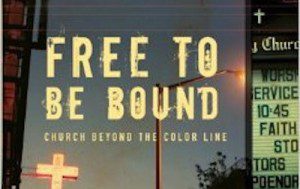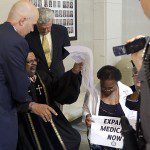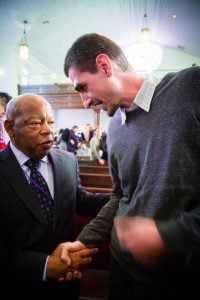 For Christmas in 1849, when nearly four million people were enslaved in America, abolitionists introduced a new carol. “It Came Upon A Midnight Clear” celebrated the announcement of “peace on earth, good will to men” as more than a sentiment to warm people’s hearts. It was a proclamation that injustice could not last forever. In the midst of the darkest night, a light had shone and was shining still.
For Christmas in 1849, when nearly four million people were enslaved in America, abolitionists introduced a new carol. “It Came Upon A Midnight Clear” celebrated the announcement of “peace on earth, good will to men” as more than a sentiment to warm people’s hearts. It was a proclamation that injustice could not last forever. In the midst of the darkest night, a light had shone and was shining still.
They say “It Came Upon a Midnight Clear” wasn’t very popular in 1849.
For Christmas in 2014, as over seven million people are stuck in America’s broken criminal justice system, we went this morning to one of North Carolina’s maximum security prisons to sing carols. The crowd that’s been growing for the past 20 years knew every word of the first verse of “It Came Upon a Midnight Clear.”
I thought about how the abolitionists were right, even if their message wasn’t popular.
We had Christmas dinner in Durham with Grandma Ann Atwater, a local veteran of the freedom struggle. Grandma Ann is a good church lady now, and she tells every activist who meets her how “nobody’s gonna change nothing in this world without the love of Jesus.” But Ann knows first hand that change doesn’t come without a fight. When she talks about those days in the late ‘60s when Jim Crow went away and black folks stood tall, knowing their power could not be denied, Ann has a line she often repeats. “You know,” she says, “we didn’t see real change ‘til things got hot.”
Here at the end of 2014, America feels pretty hot. Not as hot as the mid 19th century, thank God. Not as hot as Mississippi in 1964. But hotter than it’s been in a long time. Tens—maybe hundreds—of thousands of Americans have gone to the streets in recent weeks to insist that “Black Lives Matter.” The fire that’s burning on our streets this winter is a passion for racial justice. It is, I’m convinced, a longing for the good news that came upon a midnight clear 2,000 years ago.
In a brilliant combination of the prophetic words of James Baldwin and images from Ferguson, this short video strikes me as the most fitting Christmas light display for 2014.
Just as when Jesus was born in Bethlehem, this Christmas has been accompanied by the weeping of mothers who refuse to be consoled because their children are no more. As Baldwin saw so clearly, their tears are not new for having been so long ignored.
But Jesus’ story taught us—and some of us are beginning to see—that when one person weeps, we all weep. This is what we saw at St Johns here in Walltown last Sunday. Six partner congregations in Durham—all of them predominantly white churches—ended their worship services around noon, then walked to join us for a service of lament and solidarity. For over an hour, we all listened to stories of black sisters and brothers who’ve been stopped, searched, falsely accused, or murdered by a broken criminal justice system.
We did not invite any special guests to share these stories. We simply opened the mic to people who worship at St. Johns every week.
And the fire for justice in all of our spirits was kindled a little more.
The lines from Baldwin’s “Staggerlee Wonders” that I find most haunting are these, directed to white Christians:
Kinsmen,
I have seen you betray your Savior
(it is you who call Him Savior) so many times,
and I have spoken to Him about you,
behind your back.
Quite a lot has been going on behind your back, and,
if your phone has not yet been disconnected,
it will soon begin to ring…
If “I Can’t Breathe” and the video to back it up has been a wake up call to white America, then the phone ringing for white Christians in this land is even more piercing. For it is, in fact, a kinsman on the other end of the line. And our black sister or brother is not asking for help—not asking for justice, even—but asking, “How could you not believe me when I told you? How could you have not been listening?”
Eight years ago, I wrote a book called Free to Be Bound: Church Beyond the Color Line. It was not a wake up call, but rather an attempt to ask what white Christians would have to re-imagine if we were to hear our black sisters and brothers crying out. It was an attempt to look closely at the story of the black church in America and ask what it has to teach everyone about what it means to be Christian.
They tell me Free to Be Bound didn’t sell very well in 2008. (America was electing its first black president, after all.)
But over the past month, I’ve gotten more emails, calls, and speaking requests related to Free to Be Bound than every other project I’ve done in the past decade combined. I’m beginning to think that it simply wasn’t a book for 2007, but a book for 2015.
Thanks to an anonymous gift to School for Conversion, we’re able to make study packs of Free to Be Bound available for $5 per copy. We hope this resource might help your congregation, study group, or ministry team process the moment we’re now sojourning through together. More than anything, we hope it might foster what we’re always trying to make space for through School for Conversion: surprising friendships that not only change minds but also foster positive social change.
That would not only be a Christmas gift to you and us; it would be a light to shine bright in this midnight, clear and aching for the dawn.











